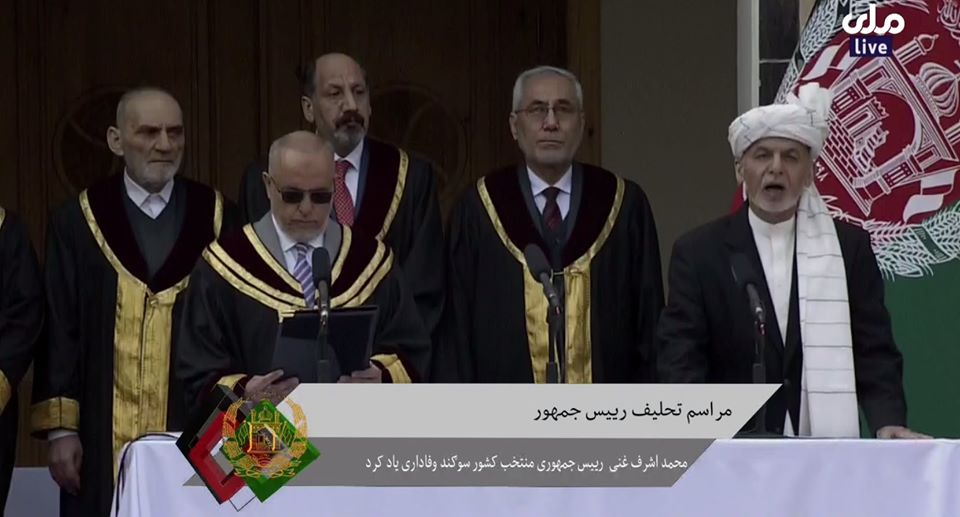Ashraf Ghani, at a ceremony held at the Presidential Palace in Kabul on Monday afternoon, has been sworn in as president for a second term.
The US special envoy Zalmay Khalilzad, US Chargé d’Affaires Ross Wilson, and US, NATO forces commander Gen. Scott Miller, as well as ambassadors from the EU, Canada, Australia, Denmark, Germany, Norway attended the ceremony.
Some prominent Afghan politicians did not attend, including former President Hamid Karzai, Abd Rab Rassoul Sayyaf, former mujahideen leader and Younus Qanuni, former vice president.
Ghani was announced the winner by the Independent Election Commission (IEC) amid controversy involving technical problems and allegations of fraud.
Abdullah, citing “fraud” in the process, has held a swearing-ceremony for himself as well.
The electoral crisis increased after the final results were announced by the IEC on February 19.
Hours after the announcement of the results, Abdullah announced the formation of an “inclusive government” by his Stability and Convergence campaign team, declaring his “victory” in the polls.
Abdullah said decisions on disputed votes were “illegal,” adding that the IEC’s results were a coup against democracy and that he does not accept them.
On Sunday, Abdullah’s office confirmed that US special envoy Zalmay Khalilzad on Monday held three meetings with the chief executive to “find a solution” for the matter but apparently did not succeed. Despite that, Abdullah’s deputy spokesman, Fraidoon Khwazoon, said hopes still to remain.
Late Sunday night sources told TOLOnews that President Ghani and CE Abdullah had met, but sources said no agreement had been reached on the election standoff.
The swearing-ceremony was delayed for several hours in order to allow for further attempts to end the crisis, but the ceremonies were held after apparently no progress was made.
On Monday, a document seen by TOLOnews, and confirmed by a number of people close to both sides, indicated that President Ghani offered a power-sharing plan to Chief Executive Abdullah in the areas of security, governance and peace.
President Ghani offered 40% of his cabinet, including one National Security Council member post, to be filled with Abdullah allies, and he also offered the chairmanship of a “Supreme Peace Council” to Abdullah, which would engage in negotiations with the Taliban (The document also mentioned that the Chair of the Peace Council would report to the president.)
Based on Ghani’s proposal, all national security ministries and institutions would report exclusively to the president.
President Ghani had proposed to Abdullah the role of “leader of the opposition,” and that he would also become head of the proposed Supreme Peace Council.
Abdullah, according to people close to him, demanded that the government shouldn’t be formed based on the election results, adding that the election results should be nullified and then the power-sharing set-up should be discussed in detail.













